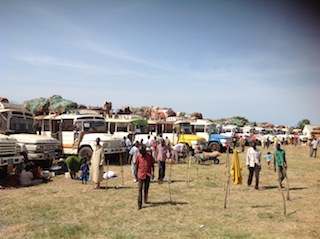Over 2,000 South Sudanese returnees arrive in Unity state
November 10, 2013 (BENTIU) – Over 2,600 South Sudanese who were stranded in Sudanese town of Kosti arrived in Unity state this week almost two and a half years since South Sudan seceded from Sudan..

After two days in a transit camp in Unity state’s Rubkotna county the returness continued their onward journey on Saturday after the accessibility of the roads was confirmed International Organization for Migration.
Samuel Razik Daniel a community leader – known as a sultan – says he stayed in Khartoum for over 20 years before decided to return to South Sudan. Over four million people were displaced by the two-decade conflict between southern rebels and the Sudanese government.
He said that many South Sudanese were worried about taking the return journey because of insecurity, expressing hope that their successful trip will open the way for others.
“These people before they could hit the road, they were fearing and some of them afraid to come with us, and as they heard we have entered into South Sudan, we had a warm welcome from our citizens, police and army and I’m sure if they see us on the televisions, those who may be there they will begin collecting their properties and to come to South Sudan”, said Daniel.
Some of the returnees said their lives in Khartoum became very hard after South Sudan broke away from Sudan.
Amelia Biba, 45, who lived in Sudan for a decade of years told Sudan Tribune that she was impressed that the governments of Sudan and South Sudan have been able to sign a deal to open their common borders.
“Because we have been open way to enter South Sudan, we were very much happy by the time we entered at the border. I have to congratulate the government of the Republic of Sudan for our time we stayed with them and to open for us way to reach here and I have to thanks the two governments for doing that”, she added.
Biba says they were relieved to finally be in the the Republic of South Sudan.
“We have not yet reached our final destination, but when we entered here we slept very well and no one of us to think about hunger or difficulty, but since we arrived here yesterday we were satisfied with food. As we entered the border and into Unity state our reception was huge and the taste of the meat of South Sudan is different than in Sudan and up to now we are still eating the meat”, said Biba.
Arkangelo Mbando said that South Sudanese women suffered from the Sudanese government’s interpretation of strict Islamic law – Shari’a. He said that many women had been jailed for making alcohol, which is a common practice for women struggling to make end meet.
He said that returnees were happy and surprised to see the development and improvements in standard of living that have occurred since they left during the civil war.
The International Organization for Migration and South Sudanese authorities have facilitated the returns of South Sudanese people who have been in Sudan for number of years.
Many South Sudanese who were willing to return after independence in July 2011 were forced to wait until Juba and Khartoum resolved various differences including an oil fee dispute that last over a year.
Since the Comprehensive Peace Agreement in 2005 at least 2.5 million South Sudanese have returned to the world’s youngest nation, according to the International Organization for Migration (IOM).
However many returnees have found poor or non-existent services and often a variety of challenges in terms of reintegrating into the community.
(ST)

